NUTR 4346 Assignment: Research Question and Citations
VerifiedAdded on 2022/08/18
|5
|1572
|21
Homework Assignment
AI Summary
This assignment addresses the relationship between obesity, depression, and emotional eating in university students. The research question investigates whether obesity and depression contribute to emotional eating in young adults. The methodology proposes an experimental design, assessing participants' demographics, BMI, depression levels (using HAM-D), and emotional eating habits (using EADES questionnaire). Statistical analysis includes descriptive statistics, t-tests, and correlation coefficients. The assignment includes inclusion and exclusion criteria for participants, financial considerations, and a justification for the research. The student provides ten peer-reviewed journal citations (2013-present) directly related to the research question, focusing on original research articles. These citations cover various aspects such as the relationship between obesity, depression, and emotional eating, disordered eating tendencies, and the impact of stress and lifestyle on eating behaviors.
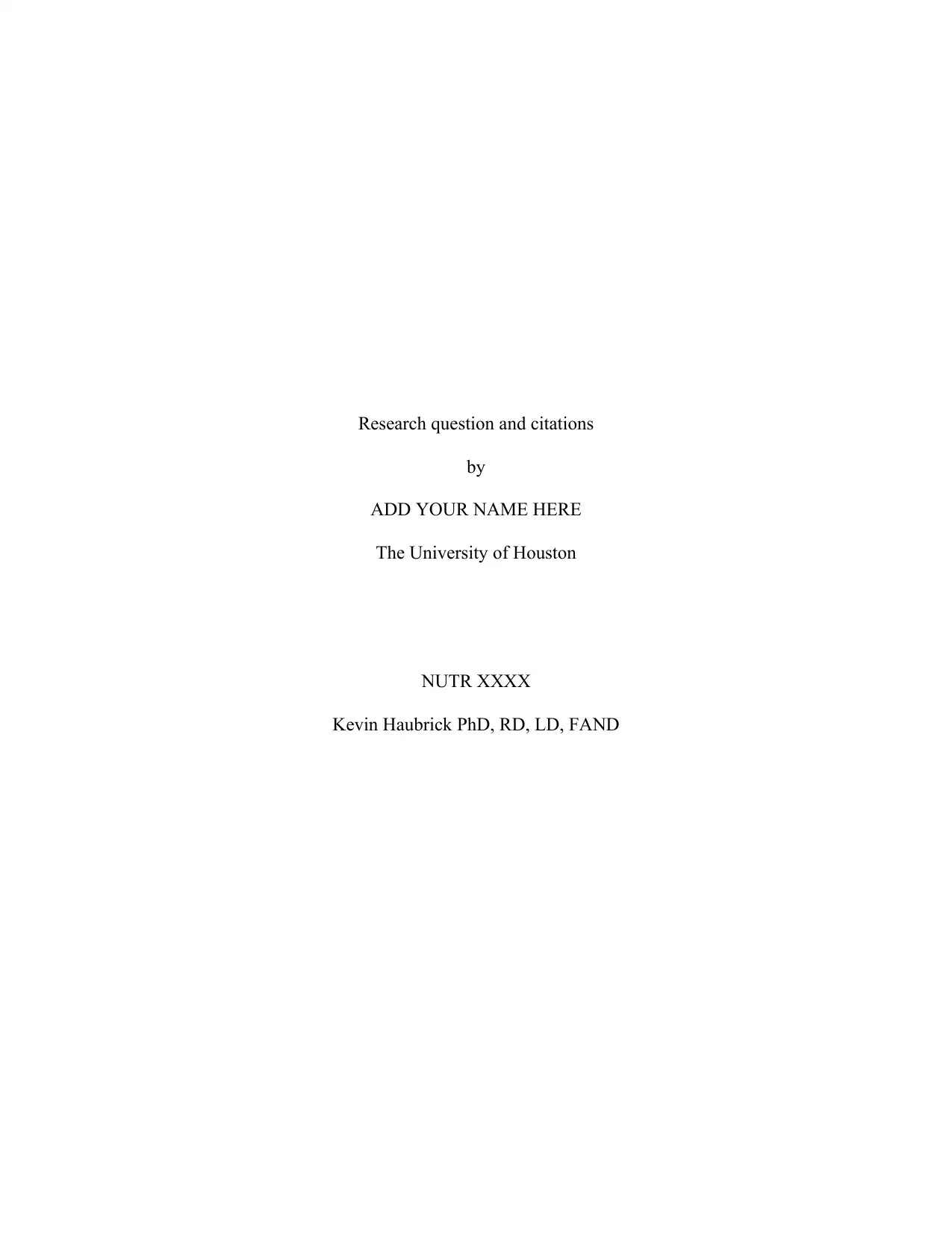
Research question and citations
by
ADD YOUR NAME HERE
The University of Houston
NUTR XXXX
Kevin Haubrick PhD, RD, LD, FAND
by
ADD YOUR NAME HERE
The University of Houston
NUTR XXXX
Kevin Haubrick PhD, RD, LD, FAND
Paraphrase This Document
Need a fresh take? Get an instant paraphrase of this document with our AI Paraphraser
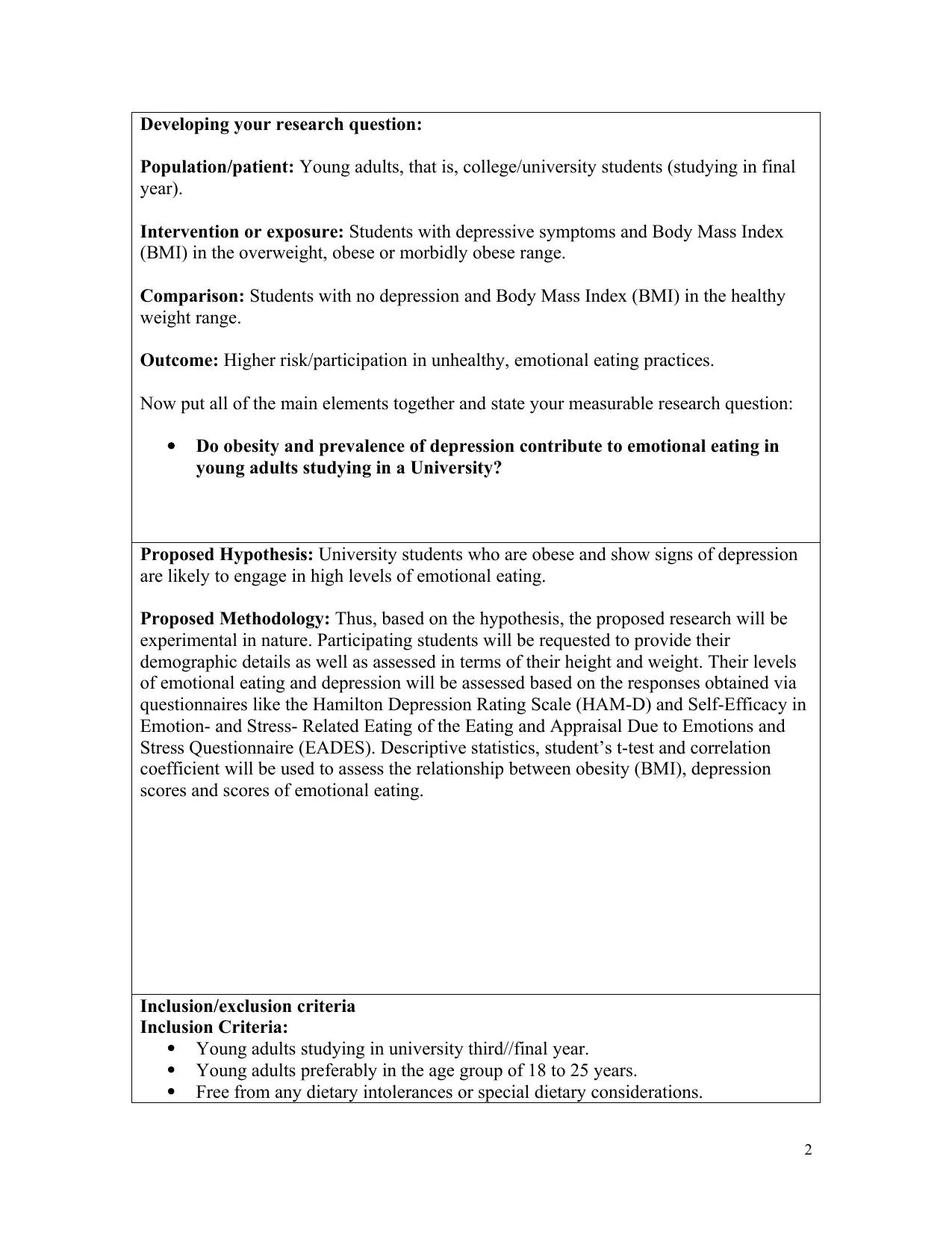
Developing your research question:
Population/patient: Young adults, that is, college/university students (studying in final
year).
Intervention or exposure: Students with depressive symptoms and Body Mass Index
(BMI) in the overweight, obese or morbidly obese range.
Comparison: Students with no depression and Body Mass Index (BMI) in the healthy
weight range.
Outcome: Higher risk/participation in unhealthy, emotional eating practices.
Now put all of the main elements together and state your measurable research question:
Do obesity and prevalence of depression contribute to emotional eating in
young adults studying in a University?
Proposed Hypothesis: University students who are obese and show signs of depression
are likely to engage in high levels of emotional eating.
Proposed Methodology: Thus, based on the hypothesis, the proposed research will be
experimental in nature. Participating students will be requested to provide their
demographic details as well as assessed in terms of their height and weight. Their levels
of emotional eating and depression will be assessed based on the responses obtained via
questionnaires like the Hamilton Depression Rating Scale (HAM-D) and Self-Efficacy in
Emotion- and Stress- Related Eating of the Eating and Appraisal Due to Emotions and
Stress Questionnaire (EADES). Descriptive statistics, student’s t-test and correlation
coefficient will be used to assess the relationship between obesity (BMI), depression
scores and scores of emotional eating.
Inclusion/exclusion criteria
Inclusion Criteria:
Young adults studying in university third//final year.
Young adults preferably in the age group of 18 to 25 years.
Free from any dietary intolerances or special dietary considerations.
2
Population/patient: Young adults, that is, college/university students (studying in final
year).
Intervention or exposure: Students with depressive symptoms and Body Mass Index
(BMI) in the overweight, obese or morbidly obese range.
Comparison: Students with no depression and Body Mass Index (BMI) in the healthy
weight range.
Outcome: Higher risk/participation in unhealthy, emotional eating practices.
Now put all of the main elements together and state your measurable research question:
Do obesity and prevalence of depression contribute to emotional eating in
young adults studying in a University?
Proposed Hypothesis: University students who are obese and show signs of depression
are likely to engage in high levels of emotional eating.
Proposed Methodology: Thus, based on the hypothesis, the proposed research will be
experimental in nature. Participating students will be requested to provide their
demographic details as well as assessed in terms of their height and weight. Their levels
of emotional eating and depression will be assessed based on the responses obtained via
questionnaires like the Hamilton Depression Rating Scale (HAM-D) and Self-Efficacy in
Emotion- and Stress- Related Eating of the Eating and Appraisal Due to Emotions and
Stress Questionnaire (EADES). Descriptive statistics, student’s t-test and correlation
coefficient will be used to assess the relationship between obesity (BMI), depression
scores and scores of emotional eating.
Inclusion/exclusion criteria
Inclusion Criteria:
Young adults studying in university third//final year.
Young adults preferably in the age group of 18 to 25 years.
Free from any dietary intolerances or special dietary considerations.
2
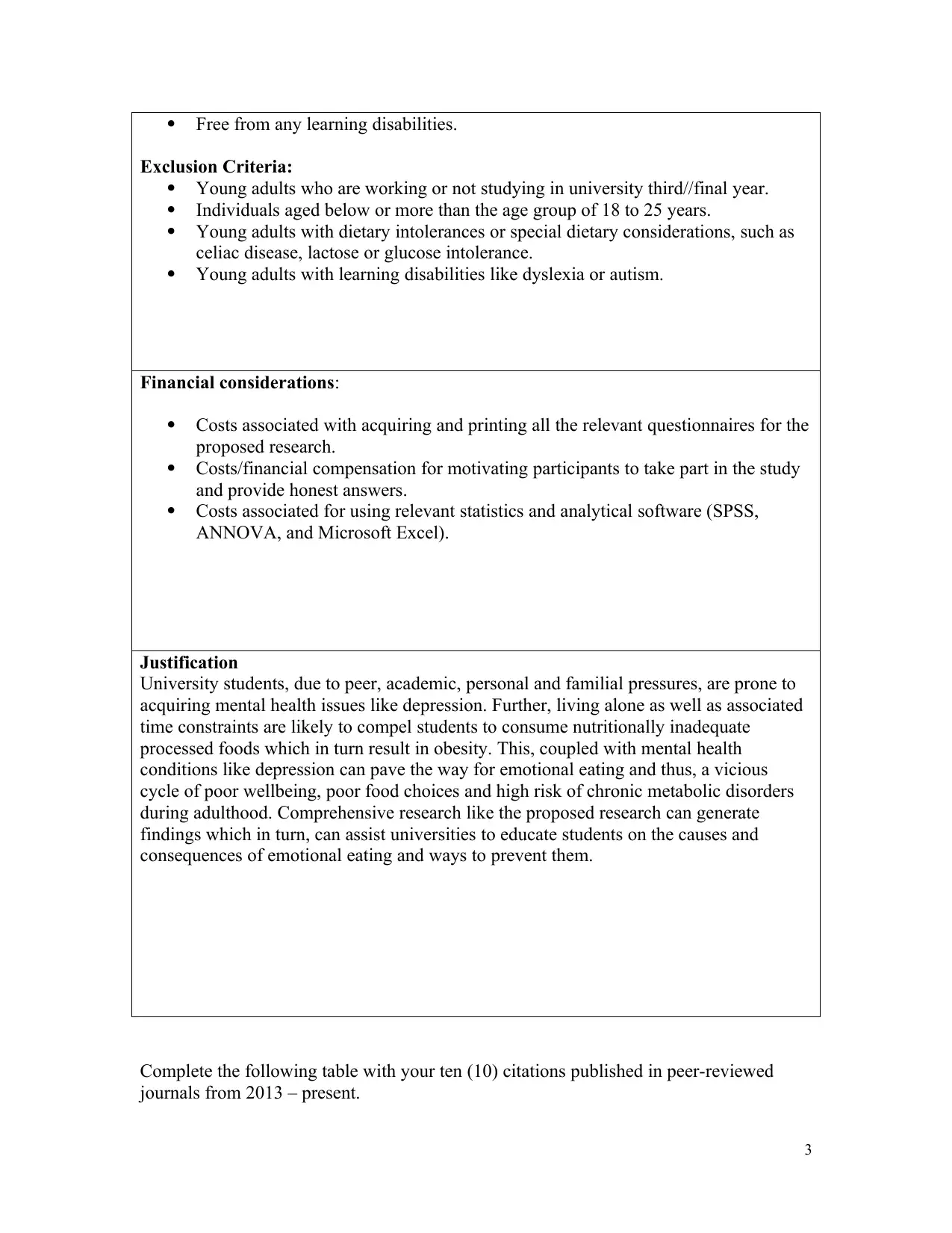
Free from any learning disabilities.
Exclusion Criteria:
Young adults who are working or not studying in university third//final year.
Individuals aged below or more than the age group of 18 to 25 years.
Young adults with dietary intolerances or special dietary considerations, such as
celiac disease, lactose or glucose intolerance.
Young adults with learning disabilities like dyslexia or autism.
Financial considerations:
Costs associated with acquiring and printing all the relevant questionnaires for the
proposed research.
Costs/financial compensation for motivating participants to take part in the study
and provide honest answers.
Costs associated for using relevant statistics and analytical software (SPSS,
ANNOVA, and Microsoft Excel).
Justification
University students, due to peer, academic, personal and familial pressures, are prone to
acquiring mental health issues like depression. Further, living alone as well as associated
time constraints are likely to compel students to consume nutritionally inadequate
processed foods which in turn result in obesity. This, coupled with mental health
conditions like depression can pave the way for emotional eating and thus, a vicious
cycle of poor wellbeing, poor food choices and high risk of chronic metabolic disorders
during adulthood. Comprehensive research like the proposed research can generate
findings which in turn, can assist universities to educate students on the causes and
consequences of emotional eating and ways to prevent them.
Complete the following table with your ten (10) citations published in peer-reviewed
journals from 2013 – present.
3
Exclusion Criteria:
Young adults who are working or not studying in university third//final year.
Individuals aged below or more than the age group of 18 to 25 years.
Young adults with dietary intolerances or special dietary considerations, such as
celiac disease, lactose or glucose intolerance.
Young adults with learning disabilities like dyslexia or autism.
Financial considerations:
Costs associated with acquiring and printing all the relevant questionnaires for the
proposed research.
Costs/financial compensation for motivating participants to take part in the study
and provide honest answers.
Costs associated for using relevant statistics and analytical software (SPSS,
ANNOVA, and Microsoft Excel).
Justification
University students, due to peer, academic, personal and familial pressures, are prone to
acquiring mental health issues like depression. Further, living alone as well as associated
time constraints are likely to compel students to consume nutritionally inadequate
processed foods which in turn result in obesity. This, coupled with mental health
conditions like depression can pave the way for emotional eating and thus, a vicious
cycle of poor wellbeing, poor food choices and high risk of chronic metabolic disorders
during adulthood. Comprehensive research like the proposed research can generate
findings which in turn, can assist universities to educate students on the causes and
consequences of emotional eating and ways to prevent them.
Complete the following table with your ten (10) citations published in peer-reviewed
journals from 2013 – present.
3
⊘ This is a preview!⊘
Do you want full access?
Subscribe today to unlock all pages.

Trusted by 1+ million students worldwide
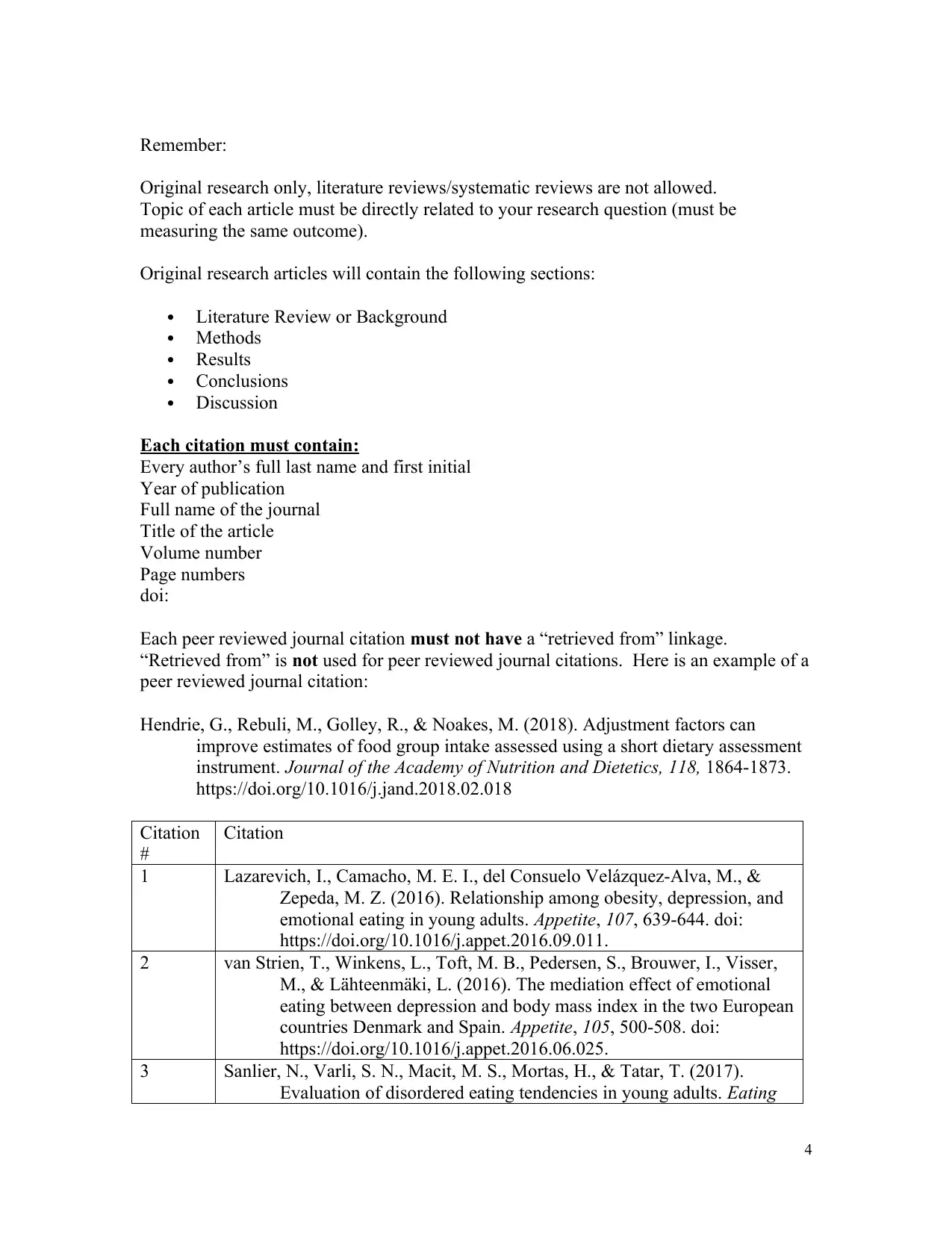
Remember:
Original research only, literature reviews/systematic reviews are not allowed.
Topic of each article must be directly related to your research question (must be
measuring the same outcome).
Original research articles will contain the following sections:
Literature Review or Background
Methods
Results
Conclusions
Discussion
Each citation must contain:
Every author’s full last name and first initial
Year of publication
Full name of the journal
Title of the article
Volume number
Page numbers
doi:
Each peer reviewed journal citation must not have a “retrieved from” linkage.
“Retrieved from” is not used for peer reviewed journal citations. Here is an example of a
peer reviewed journal citation:
Hendrie, G., Rebuli, M., Golley, R., & Noakes, M. (2018). Adjustment factors can
improve estimates of food group intake assessed using a short dietary assessment
instrument. Journal of the Academy of Nutrition and Dietetics, 118, 1864-1873.
https://doi.org/10.1016/j.jand.2018.02.018
Citation
#
Citation
1 Lazarevich, I., Camacho, M. E. I., del Consuelo Velázquez-Alva, M., &
Zepeda, M. Z. (2016). Relationship among obesity, depression, and
emotional eating in young adults. Appetite, 107, 639-644. doi:
https://doi.org/10.1016/j.appet.2016.09.011.
2 van Strien, T., Winkens, L., Toft, M. B., Pedersen, S., Brouwer, I., Visser,
M., & Lähteenmäki, L. (2016). The mediation effect of emotional
eating between depression and body mass index in the two European
countries Denmark and Spain. Appetite, 105, 500-508. doi:
https://doi.org/10.1016/j.appet.2016.06.025.
3 Sanlier, N., Varli, S. N., Macit, M. S., Mortas, H., & Tatar, T. (2017).
Evaluation of disordered eating tendencies in young adults. Eating
4
Original research only, literature reviews/systematic reviews are not allowed.
Topic of each article must be directly related to your research question (must be
measuring the same outcome).
Original research articles will contain the following sections:
Literature Review or Background
Methods
Results
Conclusions
Discussion
Each citation must contain:
Every author’s full last name and first initial
Year of publication
Full name of the journal
Title of the article
Volume number
Page numbers
doi:
Each peer reviewed journal citation must not have a “retrieved from” linkage.
“Retrieved from” is not used for peer reviewed journal citations. Here is an example of a
peer reviewed journal citation:
Hendrie, G., Rebuli, M., Golley, R., & Noakes, M. (2018). Adjustment factors can
improve estimates of food group intake assessed using a short dietary assessment
instrument. Journal of the Academy of Nutrition and Dietetics, 118, 1864-1873.
https://doi.org/10.1016/j.jand.2018.02.018
Citation
#
Citation
1 Lazarevich, I., Camacho, M. E. I., del Consuelo Velázquez-Alva, M., &
Zepeda, M. Z. (2016). Relationship among obesity, depression, and
emotional eating in young adults. Appetite, 107, 639-644. doi:
https://doi.org/10.1016/j.appet.2016.09.011.
2 van Strien, T., Winkens, L., Toft, M. B., Pedersen, S., Brouwer, I., Visser,
M., & Lähteenmäki, L. (2016). The mediation effect of emotional
eating between depression and body mass index in the two European
countries Denmark and Spain. Appetite, 105, 500-508. doi:
https://doi.org/10.1016/j.appet.2016.06.025.
3 Sanlier, N., Varli, S. N., Macit, M. S., Mortas, H., & Tatar, T. (2017).
Evaluation of disordered eating tendencies in young adults. Eating
4
Paraphrase This Document
Need a fresh take? Get an instant paraphrase of this document with our AI Paraphraser
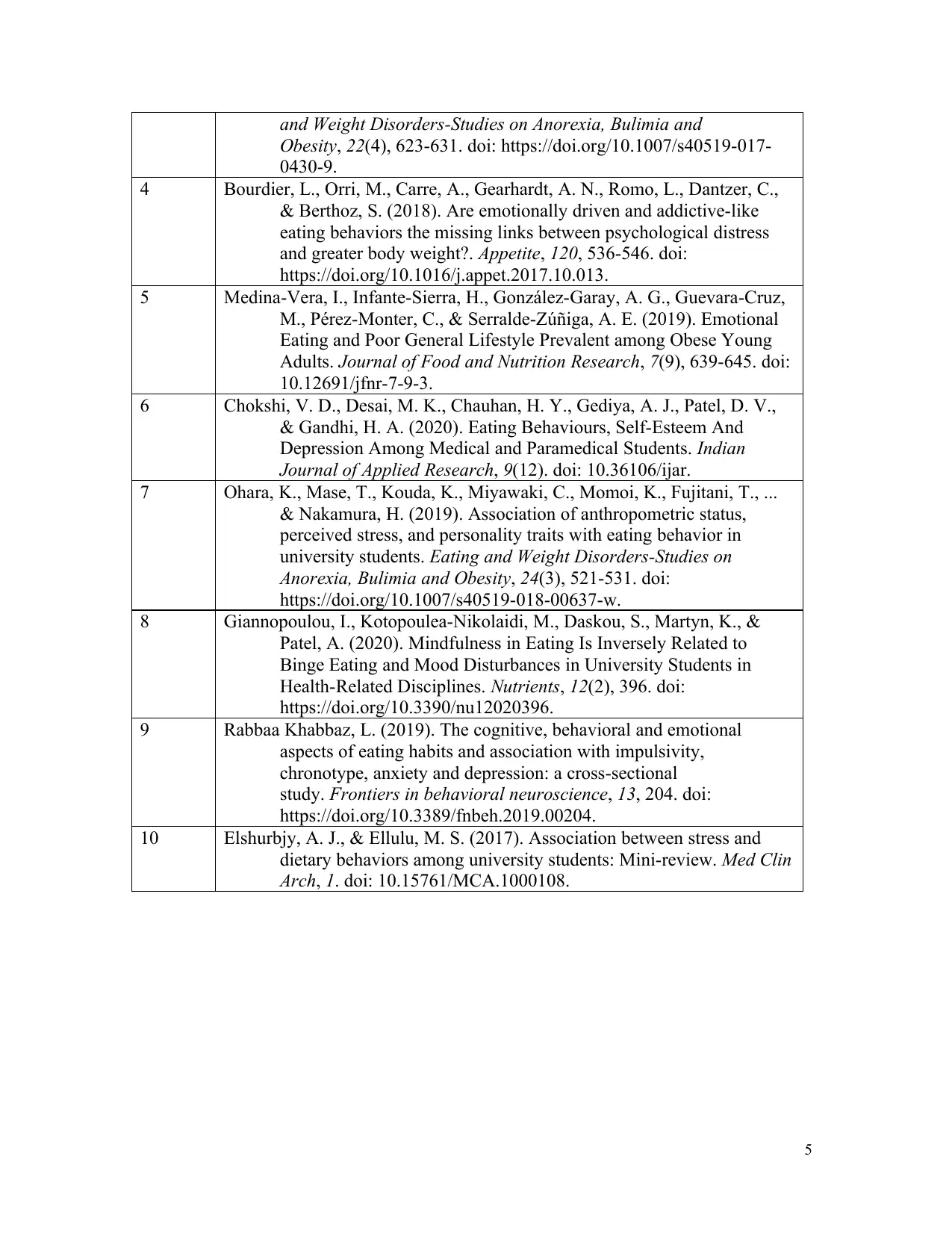
and Weight Disorders-Studies on Anorexia, Bulimia and
Obesity, 22(4), 623-631. doi: https://doi.org/10.1007/s40519-017-
0430-9.
4 Bourdier, L., Orri, M., Carre, A., Gearhardt, A. N., Romo, L., Dantzer, C.,
& Berthoz, S. (2018). Are emotionally driven and addictive-like
eating behaviors the missing links between psychological distress
and greater body weight?. Appetite, 120, 536-546. doi:
https://doi.org/10.1016/j.appet.2017.10.013.
5 Medina-Vera, I., Infante-Sierra, H., González-Garay, A. G., Guevara-Cruz,
M., Pérez-Monter, C., & Serralde-Zúñiga, A. E. (2019). Emotional
Eating and Poor General Lifestyle Prevalent among Obese Young
Adults. Journal of Food and Nutrition Research, 7(9), 639-645. doi:
10.12691/jfnr-7-9-3.
6 Chokshi, V. D., Desai, M. K., Chauhan, H. Y., Gediya, A. J., Patel, D. V.,
& Gandhi, H. A. (2020). Eating Behaviours, Self-Esteem And
Depression Among Medical and Paramedical Students. Indian
Journal of Applied Research, 9(12). doi: 10.36106/ijar.
7 Ohara, K., Mase, T., Kouda, K., Miyawaki, C., Momoi, K., Fujitani, T., ...
& Nakamura, H. (2019). Association of anthropometric status,
perceived stress, and personality traits with eating behavior in
university students. Eating and Weight Disorders-Studies on
Anorexia, Bulimia and Obesity, 24(3), 521-531. doi:
https://doi.org/10.1007/s40519-018-00637-w.
8 Giannopoulou, I., Kotopoulea-Nikolaidi, M., Daskou, S., Martyn, K., &
Patel, A. (2020). Mindfulness in Eating Is Inversely Related to
Binge Eating and Mood Disturbances in University Students in
Health-Related Disciplines. Nutrients, 12(2), 396. doi:
https://doi.org/10.3390/nu12020396.
9 Rabbaa Khabbaz, L. (2019). The cognitive, behavioral and emotional
aspects of eating habits and association with impulsivity,
chronotype, anxiety and depression: a cross-sectional
study. Frontiers in behavioral neuroscience, 13, 204. doi:
https://doi.org/10.3389/fnbeh.2019.00204.
10 Elshurbjy, A. J., & Ellulu, M. S. (2017). Association between stress and
dietary behaviors among university students: Mini-review. Med Clin
Arch, 1. doi: 10.15761/MCA.1000108.
5
Obesity, 22(4), 623-631. doi: https://doi.org/10.1007/s40519-017-
0430-9.
4 Bourdier, L., Orri, M., Carre, A., Gearhardt, A. N., Romo, L., Dantzer, C.,
& Berthoz, S. (2018). Are emotionally driven and addictive-like
eating behaviors the missing links between psychological distress
and greater body weight?. Appetite, 120, 536-546. doi:
https://doi.org/10.1016/j.appet.2017.10.013.
5 Medina-Vera, I., Infante-Sierra, H., González-Garay, A. G., Guevara-Cruz,
M., Pérez-Monter, C., & Serralde-Zúñiga, A. E. (2019). Emotional
Eating and Poor General Lifestyle Prevalent among Obese Young
Adults. Journal of Food and Nutrition Research, 7(9), 639-645. doi:
10.12691/jfnr-7-9-3.
6 Chokshi, V. D., Desai, M. K., Chauhan, H. Y., Gediya, A. J., Patel, D. V.,
& Gandhi, H. A. (2020). Eating Behaviours, Self-Esteem And
Depression Among Medical and Paramedical Students. Indian
Journal of Applied Research, 9(12). doi: 10.36106/ijar.
7 Ohara, K., Mase, T., Kouda, K., Miyawaki, C., Momoi, K., Fujitani, T., ...
& Nakamura, H. (2019). Association of anthropometric status,
perceived stress, and personality traits with eating behavior in
university students. Eating and Weight Disorders-Studies on
Anorexia, Bulimia and Obesity, 24(3), 521-531. doi:
https://doi.org/10.1007/s40519-018-00637-w.
8 Giannopoulou, I., Kotopoulea-Nikolaidi, M., Daskou, S., Martyn, K., &
Patel, A. (2020). Mindfulness in Eating Is Inversely Related to
Binge Eating and Mood Disturbances in University Students in
Health-Related Disciplines. Nutrients, 12(2), 396. doi:
https://doi.org/10.3390/nu12020396.
9 Rabbaa Khabbaz, L. (2019). The cognitive, behavioral and emotional
aspects of eating habits and association with impulsivity,
chronotype, anxiety and depression: a cross-sectional
study. Frontiers in behavioral neuroscience, 13, 204. doi:
https://doi.org/10.3389/fnbeh.2019.00204.
10 Elshurbjy, A. J., & Ellulu, M. S. (2017). Association between stress and
dietary behaviors among university students: Mini-review. Med Clin
Arch, 1. doi: 10.15761/MCA.1000108.
5
1 out of 5
Related Documents
Your All-in-One AI-Powered Toolkit for Academic Success.
+13062052269
info@desklib.com
Available 24*7 on WhatsApp / Email
![[object Object]](/_next/static/media/star-bottom.7253800d.svg)
Unlock your academic potential
Copyright © 2020–2026 A2Z Services. All Rights Reserved. Developed and managed by ZUCOL.




